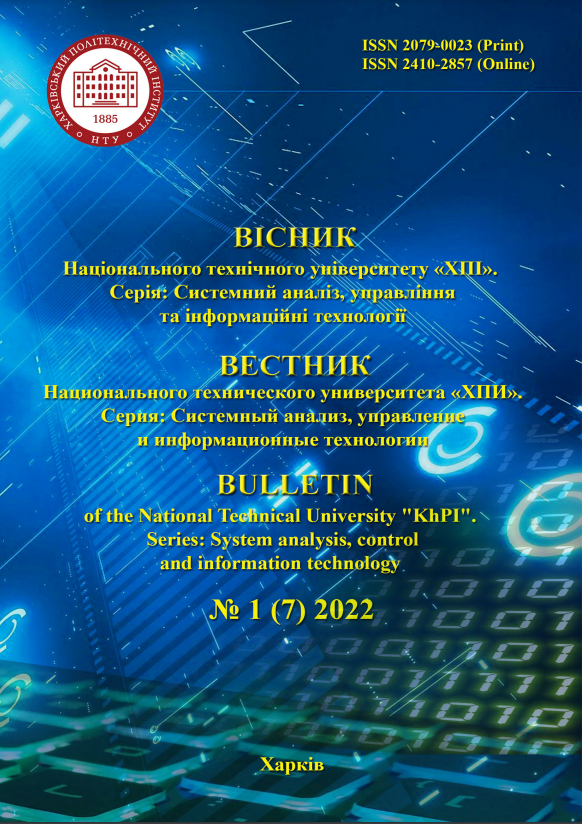OPTIMIZATION OF RESOURCE DISTRIBUTION UNDER THE CONDITIONS OF FUZZY INITIAL DATA
DOI:
https://doi.org/10.20998/2079-0023.2022.01.02Keywords:
problem of rational distribution of a limited resource, fuzzy description of the criterion, mathematical model and solution methodAbstract
The problem of resource distribution in several directions of its spending is considered for the case when the parameters of the distribution efficiency criterion are fuzzy numbers with given membership functions. The purpose of the study is the development of mathematical models and methods for solving the problem of resource allocation for practically the most important criteria, taking into account the fuzziness of the numerical values – of their parameters. An analysis of the well-known approach to solving the problem is carried out and its main shortcomings are identified, which motivate the continuation of research. A method for solving the stated problem is proposed, the computational implementation of which contains three stages. At the first stage, using the membership functions of the fuzzy parameters of the problem, the membership function of the criterion is formed. The function obtained in this case is approximated at the second stage using a four-parameter distribution. An important advantage of this distribution is the possibility, by varying the numerical values – of its parameters over a wide range, to change the mathematical expectation, variance, and asymmetry of the values – specified by this distribution, providing a high quality of approximation. Thus, the criterion for the effectiveness of the task is determined. At the third stage, a mathematical model of the optimization problem of the distribution of a limited resource is formulated. The following three options for constructing an optimality criterion are considered: maximizing the criterion with the maximum possible value of its membership function; maximization of the criterion, provided that the value of its membership function is not lower than the specified one; maximization of the criterion, provided that the value of the membership function of each of its terms is not lower than the specified one. Each of the resulting problems is a standard problem of mathematical programming and is solved by known methods. A possible direction for further research is discussed in order to improve the adequacy of the used analytical descriptions of the membership functions of the fuzzy parameters of the problem.
References
Zamkov O. O., Tolstopyatenko A. V., Cheremnykh Yu. N. Matematicheskie metodyi v ekonomike [Mathematical Methods in Economics]. Moscow, Delo i Servis Publ., 2001. 368 p.
McConnell C R., Brue S. L. Economics. McGraw-Hill Education, 2006. 808 p. (Russ. ed.: Makkonel K. R., Bryu S. L. Ekonomiks. Moscow, Respublika Publ., 2011. 1010 p.).
Zadeh L. A. Fuzzy sets. Information and control. 1965, vol. 8, pp. 338–353
Orlovsky S. A. Problemyi prinyatiya resheniy pri nechetkoy ishodnoy informatsii [Decision-making problems with fuzzy initial information]. Moscow, Nauka Publ., 1981. 204 p.
Kofman A. Vvedenie v teoriyu nechetkih mnozhestv [Introduction to the theory of fuzzy sets]. Moscow, Radio i svyaz Publ., 1982. 432 p.
Zadeh L. A. The concept of a linguistic variable and its application to approximate reasoning. Information Sciences. 1975, vol. 8, issue 3, pp. 199–249. (Russ. ed.: Zadeh L. A. Ponyatie lingvisticheskoy peremennoy i ego primenenie k prinyatiyu priblizhennyih resheniy. Moscow, Respublika Publ., 2011. 1010 p. Mir Publ., 1976. 165 p.).
Negoita C. V., Sularia M. On fuzzy mathematical programming and tolerances in planning. ECEESR. 1976, vol. 1, pp. 3–14.
Raskin L. G., Seraya O. V. Nechetkaya matematika [Fuzzy Mathematics]. Kharkov, Parus Publ., 2008. 352 p.
Raskin L. G., Kirichenko I. O. Kontinualnoe lineynoe programmirovanie [Continuum linear programming]. Kharkov, VIVV Publ., 2005. 176 p.
Raskin L. G., Pustovoitov P. E. Reshenie mnogonomenklaturnoy zadachi upravleniya zapasami po veroyatnostnomu kriteriyu [Solution of a multi-product inventory management problem by a probabilistic criterion]. Vestnik Nats. tekhn. un-ta "KhPI" [Bulletin of the National tech. University "KhPI"]. Kharkov, 2002, no. 13, pp. 49–53.
Raskin L., Sira O. Fuzzy models of rough mathematics. Eastern European journal of Enterprise Technologies. 2016, vol. 5, no. 6, pp. 53–60.
Raskin L., Sira O. Methods of solving fuzzy problem of mathematical programing. Eastern European journal of Enterprise Technologies. 2016, vol. 5, no. 4, pp. 23–28.
Downloads
Published
How to Cite
Issue
Section
License
LicenseAuthors who publish with this journal agree to the following terms:
- Authors retain copyright and grant the journal right of first publication with the work simultaneously licensed under a Creative Commons Attribution License that allows others to share the work with an acknowledgement of the work's authorship and initial publication in this journal.
- Authors are able to enter into separate, additional contractual arrangements for the non-exclusive distribution of the journal's published version of the work (e.g., post it to an institutional repository or publish it in a book), with an acknowledgement of its initial publication in this journal.
- Authors are permitted and encouraged to post their work online (e.g., in institutional repositories or on their website) prior to and during the submission process, as it can lead to productive exchanges, as well as earlier and greater citation of published work (See The Effect of Open Access).

